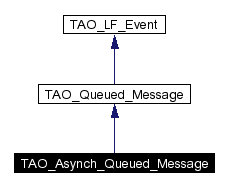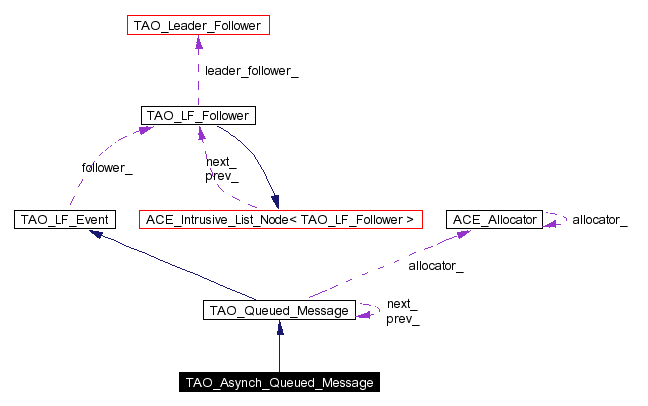
#include <Asynch_Queued_Message.h>
Inheritance diagram for TAO_Asynch_Queued_Message:


Public Methods | |
| TAO_Asynch_Queued_Message (const ACE_Message_Block *contents, ACE_Allocator *alloc=0) | |
| virtual | ~TAO_Asynch_Queued_Message (void) |
| Destructor. More... | |
| virtual size_t | message_length (void) const |
| If the message has been partially sent it returns the number of bytes that are still not sent. More... | |
| virtual int | all_data_sent (void) const |
| Return 1 if all the data has been sent. More... | |
| virtual void | fill_iov (int iovcnt_max, int &iovcnt, iovec iov[]) const |
| Different versions of this class represent the message using either a single buffer, or a message block. More... | |
| virtual void | bytes_transferred (size_t &byte_count) |
| After the TAO_Transport class completes a successful (or partially successful) I/O operation it must update the state of all the messages queued. More... | |
| virtual TAO_Queued_Message * | clone (ACE_Allocator *alloc) |
| NOTE: No reason to belive why this would be called. But have it here for the sake of uniformity. More... | |
| virtual void | destroy (void) |
| Reliable messages are allocated from the stack, thus they do not be deallocated. More... | |
Protected Methods | |
| TAO_Asynch_Queued_Message (char *buf, size_t size, ACE_Allocator *alloc=0) | |
Private Attributes | |
| size_t | size_ |
| The number of bytes in the buffer. More... | |
| size_t | offset_ |
Data up to offset has been sent already, only the [offset_,size_) range remains to be sent. More... | |
| char * | buffer_ |
| The buffer containing the complete message. More... | |
|
||||||||||||
|
|
|
|
Destructor.
|
|
||||||||||||||||
|
|
|
|
Return 1 if all the data has been sent.
Reimplemented from TAO_Queued_Message. |
|
|
After the TAO_Transport class completes a successful (or partially successful) I/O operation it must update the state of all the messages queued. This callback method is used by each message to update its state and determine if all the data has been sent already.
Reimplemented from TAO_Queued_Message. |
|
|
NOTE: No reason to belive why this would be called. But have it here for the sake of uniformity. @ Reimplemented from TAO_Queued_Message. |
|
|
Reliable messages are allocated from the stack, thus they do not be deallocated. Asynchronous (SYNC_NONE) messages are allocated from the heap (or a pool), they need to be reclaimed explicitly. Reimplemented from TAO_Queued_Message. |
|
||||||||||||||||
|
Different versions of this class represent the message using either a single buffer, or a message block. This method allows a derived class to fill up the contents of an io vector, the TAO_Transport class uses this method to group as many messages as possible in an iovector before sending them to the OS I/O subsystem.
Reimplemented from TAO_Queued_Message. |
|
|
If the message has been partially sent it returns the number of bytes that are still not sent.
Reimplemented from TAO_Queued_Message. |
|
|
The buffer containing the complete message.
|
|
|
Data up to
|
|
|
The number of bytes in the buffer.
|
 1.2.13.1 written by Dimitri van Heesch,
© 1997-2001
1.2.13.1 written by Dimitri van Heesch,
© 1997-2001